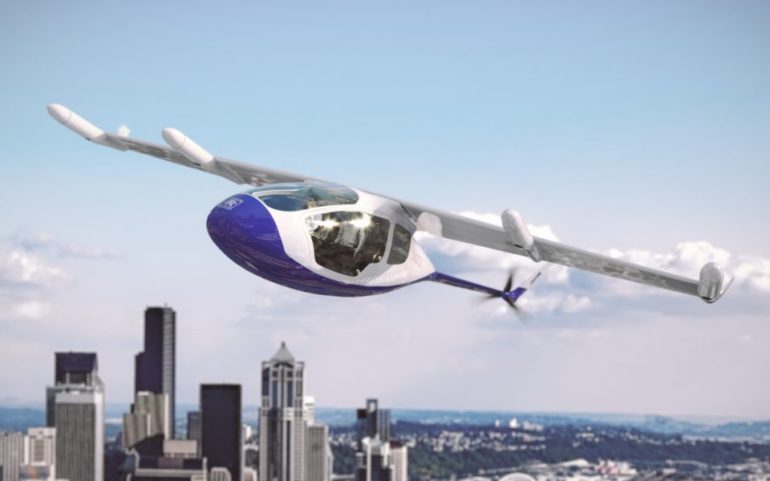Rolls-Royce has released plans for a flying taxi that could be taking to the skies in the early 2020s.
The British manufacturer will unveil its designs for an electric vertical take-off and landing (EVTOL) vehicle at the Farnborough Airshow, which will be officially opened by Prime Minister Theresa May tomorrow.
The air show is one of the biggest events in the aviation calendar, and May is expected to use the occasion to announce a slew of new initiatives to boost employment and growth in the UK’s aerospace industry, and to protect the supply chains that companies such as Bombardier, Rolls-Royce and Airbus depend upon to manufacture aircrafts.
Rolls-Royce has claimed that its flying vehicle design could be adapted for personal transport, public transport, logistics and military applications. The firm has released design specs for two different versions – a ‘flying taxi’ which can transport four or five people at speeds of up to 250 miles per hour for approximately 500 miles; and a military version which features multiple propellers and a smaller cabin.
The firm is now looking for partners who can help with the airframing and electrical system to help bring the vehicle to market within the next few years.
“Building on our existing expertise in electric technologies and aviation, Rolls-Royce is actively exploring a range of possible markets and applications for electric and hybrid electric flight,” said Rob Watson, who heads up Rolls-Royce’s electrical team. “We are well placed to play a leading role in the emerging world of personal air mobility and will also look to work in collaboration with a range of partners.
“Electrification is an exciting and inescapable trend across industrial technology markets and while the move to more electric propulsion will be gradual for us, it will ultimately be a revolution.”
The initial concept vehicle uses gas turbine technology to generate electricity to power six electric propulsors specially designed to have a low noise profile. This means that the design would not require recharging, as the battery would be powered by the M250 gas turbine.
If successful in finding a partner, Rolls-Royce would join the ranks of Airbus, Google and Uber in the race to create the world’s first flying taxi.
Earlier this year, Airbus began conducting test flights of its own EVTOL vehicle, releasing video footage of the Vahana craft hovering in mid-air for 53 seconds.
Meanwhile, Uber has hired a NASA researcher to help with its flying taxi plans. And in Silicon Valley, a number of start-ups are investing heavily in the emerging sector – most notably Kitty Hawk, a fully-electric EVTOL which has been backed by Google founder Larry Page.
However, Watson claimed that Rolls-Royce has an advantage due to its “strong track record as pioneers in aviation”.
“From developing the first turbo-prop and jet engines, to creating the world’s most efficient large civil aero-engine and vertical take-off and landing solutions, we have a very strong pedigree,” he said. “As the third generation of aviation begins to dawn, it’s time to be pioneers yet again.”
Earlier this month, the government pledged to spend £343m of R&D funding to support new technology in aviation, including green technologies such as electrification. It is not yet known if Rolls-Royce’s EVTOL vehicles will be eligible to benefit from these funds.
On the opening day of the air show, the Prime Minister will tour the Farnborough site to inspect a range of new and developing aerospace technologies before delivering a speech to industry leaders where she is expected to lay out plans for a new Aerospace Sector Deal.
“We can all feel incredibly proud of our position as a leading aerospace nation. By working closely together, government and industry have ensured we remain at the forefront of civil aviation and that our air power is second to none,” May will say. “Today I want us to build on that, and ensure not only that we retain our prominence, but that in an increasingly competitive industry we make the most of the opportunities that lie ahead.”


